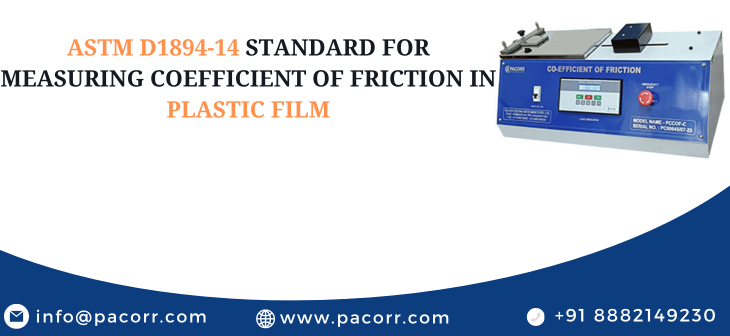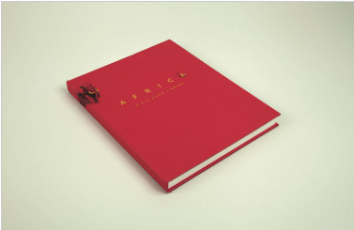
Coefficient of Friction tester, particularly those adhering to standards like ASTM D1894-14 and ISO 8295, are essential tools in the arsenal of manufacturers and researchers alike. This blog will delve into the specifics of COF testing, explaining its importance, the role of these standards, and how Pacorr's testing equipment stands out in the market for ensuring precise and reliable results.
Understanding the Coefficient of Friction: Why It Matters
The coefficient of friction (COF) is a vital measure in understanding how two surfaces interact under certain conditions. It's a dimensionless number that describes the ratio of the force of friction between two bodies and the force pressing them together. In practical terms, COF testing helps predict how materials will behave in real-world applications—whether it's the slipperiness of a floor, the grip of a tire, or the smoothness of packaging materials.
The Role of ASTM D1894-14 and ISO 8295 in COF Testing
ASTM D1894-14 and ISO 8295 are two prominent standards used globally to measure the sliding friction of plastic film and sheeting, among other materials. Here’s a closer look at each:
- ASTM D1894-14: This standard outlines the method for determining the sliding friction of plastic film and similar materials. The test measures the force required to pull one material over another and is an indicator of the ease with which two surfaces slide against each other. This standard is crucial for industries where materials handling and packaging are essential, ensuring that products can be transported and stored without issues.
- ISO 8295: ISO 8295 is similar to ASTM D1894-14 but is internationally recognized and includes specifics for testing under different conditions, such as varying temperatures and humidity levels. This standard is often used in quality control processes across various industries, including automotive, aerospace, and electronics, where precise material characteristics are critical for performance and safety.
Pacorr’s Coefficient of Friction Testers: Leading the Charge
Pacorr stands as a beacon in the testing equipment industry, offering COF testers that not only meet but exceed industry standards like ASTM D1894-14 and ISO 8295. Here’s what makes Pacorr’s COF testers a preferred choice:
- Accuracy and Reliability: Pacorr’s COF testers are engineered to provide highly accurate and repeatable results. This precision is vital for ensuring consistent quality in production and complying with rigorous safety standards.
- Customization and Versatility: Understanding that different materials require different testing environments, Pacorr offers customizable solutions that can simulate a variety of environmental conditions. Whether it's varying temperatures, humidity, or pressure, their testers are equipped to handle a wide range of testing scenarios.
- User-Friendly Design: With simplicity in mind, Pacorr’s testers are designed for ease of use. Their intuitive interfaces allow operators to conduct tests efficiently, minimizing training time and speeding up the overall testing process.
- After-Sales Support: Pacorr’s commitment to its customers extends beyond the sale of equipment. Their comprehensive after-sales service ensures that users get the most out of their investment, with expert support only a call away.
Impact on Industries: Real-World Applications of COF Testing
COF testing influences many sectors, from packaging and automotive to textiles and construction. For instance, in the packaging industry, proper friction levels ensure that films and sheets can be handled and transported efficiently without the risk of slipping or damage. In the automotive sector, understanding the frictional properties of materials can lead to better, safer car components that perform well under various conditions.
Navigating Challenges in COF Testing
Despite its importance, COF testing presents challenges, such as dealing with variable material properties and adapting to fast-changing industry standards. Pacorr’s continuous innovation and adaptability in their testing solutions help industries stay ahead of these challenges, ensuring that their materials meet both current and future standards.
FAQs: Everything You Wanted to Know About COF Testing
Q: How often should COF testing be performed?
A: Frequency depends on the specific industry and material type, but generally, it is performed during the material selection phase and periodically throughout production as part of quality control.
Q: Can COF testers be used for materials other than plastics?
A: Yes, while they are primarily designed for plastics, Pacorr’s COF testers can be adapted for a range of materials including metals, ceramics, and composite surfaces.
Q: Are there specific environmental conditions under which COF should be tested?
A: Yes, testing should account for operational environments. For example, materials used outdoors should be tested under different moisture and temperature conditions to simulate real-world scenarios.
Understanding and measuring the coefficient of friction is more than just a technical requirement—it's a fundamental aspect of material science that affects product functionality, safety, and consumer satisfaction. With standards like ASTM D1894-14 and ISO 8295 providing guidelines, and companies like Pacorr delivering high-quality testing equipment, industries are better equipped to develop products that are not only efficient but also safe and reliable.

